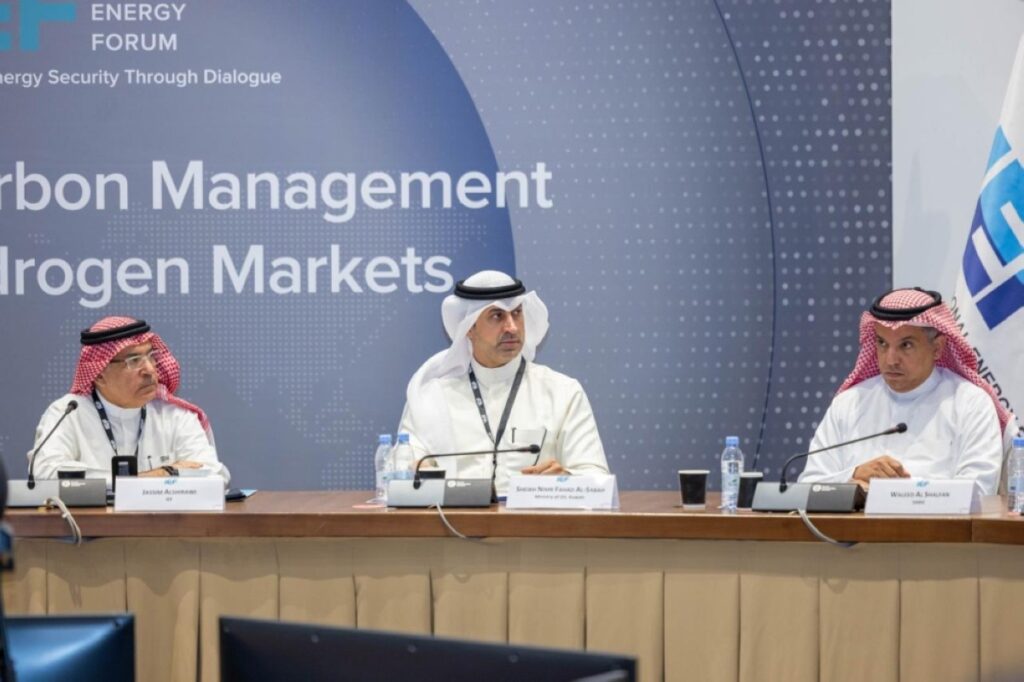KUWAIT: Undersecretary of the Ministry of Oil, Sheikh Dr Nimr Fahd Al-Malik Al-Sabah, affirmed on Wednesday that Kuwait showcased its pioneering experience in carbon management and the digital transformation of energy data during the High-Level Advisory Committee meeting of the International Energy Forum (IEF) in Riyadh. Speaking to Kuwait News Agency (KUNA) after the session, Sheikh Nimr Al-Sabah said Kuwait’s selection to present a technical paper in the discussion titled “Carbon Management and Gas Developments” underscores the country’s active role in global energy dialogues and its proactive position amid rapid developments in international energy markets.
He noted that the presentation highlighted Kuwait’s commitment to adopting advanced emissions management practices and promoting innovation across the energy, gas, and hydrogen sectors. The session provided a platform for specialists to exchange views on enhancing coordination between member states and pursuing joint actions to meet future energy challenges. Sheikh Nimr Al-Sabah emphasized that Kuwait’s contribution reflects its focus on reducing emissions and improving operational efficiency in the oil sector.
The Kuwaiti delegation included, alongside Sheikh Dr Nimr Al-Malik Al-Sabah, Engineer Khaled Al-Dayeen, Assistant Undersecretary for Technical Affairs and member of the IEF Investment Committee. Discussions at the meeting also addressed the use of modern technologies to support clean energy transition, the development of global energy data systems, and strengthening cooperation between governments and sectors to achieve energy security, sustainability, and development goals.


Director of Public Relations and Petroleum Media at the Ministry of Oil, Sheikha Tamadher Khaled Al-Ahmad Al-Sabah
Petroleum media workshop
In a related development, Sheikha Tamadher Khaled Al-Ahmad Al-Sabah, Director of the Public Relations and Petroleum Media Department at the Ministry of Oil, highlighted the success of the specialized Gulf workshop on petroleum media for non-journalists, held under the title “Strengthening the Gulf Message on Energy and Climate Issues.” In a statement on Wednesday, Sheikha Tamadher Al-Sabah said that holding the workshop in Kuwait last Sunday reflects the country’s commitment to supporting joint Gulf initiatives and enhancing communication on the oil and gas sector. She explained that the idea for the workshop originated during the meeting of petroleum ministry undersecretaries from GCC countries, hosted in Kuwait on September 30, 2025.
The Ministry of Oil had submitted a proposal to train non-journalists in engaging with international media, while understanding the economic and environmental contexts of energy and climate issues. The proposal was approved by GCC member states, recognizing its importance in establishing a unified and professional regional discourse.
Sheikha Tamadher Al-Sabah added that the workshop aimed to strengthen institutional capabilities, raise awareness of energy issues, and deepen understanding of the challenges facing GCC countries in global forums. The workshop focused on two key themes: “Gulf Media and Energy” and “Public Awareness of Energy and Climate Issues,” providing a foundation to build a consistent Gulf message on energy and climate challenges.
She emphasized that the workshop achieved clear added value through in-depth discussions and the exchange of expertise among participants from various GCC countries. It contributed to strengthening the shared understanding of Gulf policies on sustainability and clean energy, and to developing communication tools capable of conveying the Gulf message to the international community effectively.
Sheikha Tamadher Al-Sabah expressed appreciation for the presence of Oil Minister Tariq Al-Roumi at the opening, noting that his support and oversight were instrumental to the workshop’s success. She reiterated the Ministry’s commitment to enhancing Gulf communication, developing institutional capacities, and elevating Kuwait and GCC countries’ standing internationally, while highlighting the region’s positive role in stabilizing global energy markets and promoting sustainability. — KUNA

